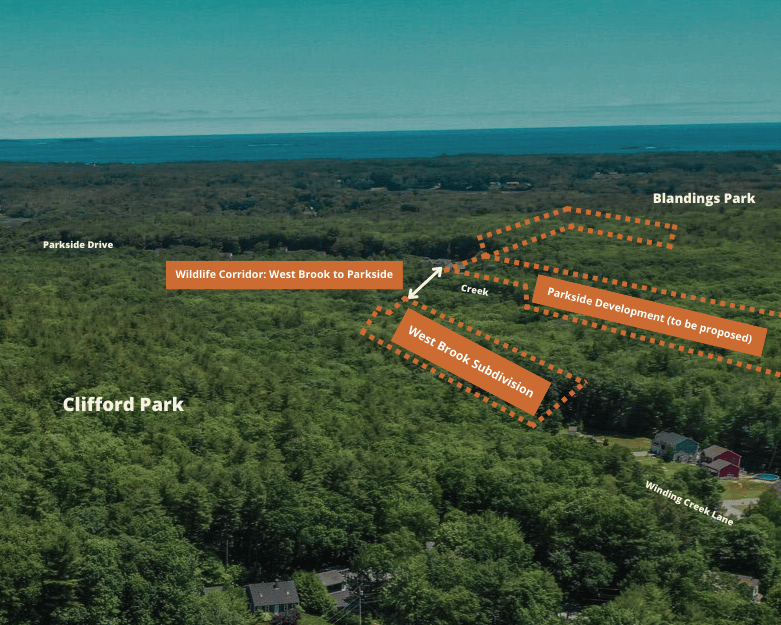West Brook Subdivision
Setting the Record Straight
An article by Randy Seaver about the withdrawal of our lawsuit against the City of Biddeford and developer Mike Eon contains misleading statements and critical omissions. While we made the difficult decision to withdraw due to cost, the issues with this project remain unresolved. The City is still allowing a development to move forward that violates multiple local and state environmental regulations, threatens one of the most important wildlife corridors in Biddeford, and was only made possible by giving away public land.
A Land Swap That Was Never a Fair Deal
The article presents the land swap as a win-win for the City, but that ignores key facts. The land Eon transferred to the City was largely undevelopable—steep, wet, and already subject to environmental restrictions. In contrast, the four acres he received were prime land within Clifford Park, directly enabling the West Brook Subdivision’s approval. This was not a straightforward trade but a deal designed to benefit a developer while disregarding the long-term environmental impacts on one of Biddeford’s most important green spaces.
The City Ignored Environmental Protections
From the beginning, the West Brook Subdivision has been fundamentally incompatible with Biddeford’s environmental regulations. The site is filled with wetlands, steep slopes, and forest critical to local wildlife movement between Clifford Park and Blandings Park, two of Biddeford’s most ecologically valuable natural areas.
The project violates multiple local and state environmental protections, including:
-
Wetlands and habitat protections (BMC § 66-39(b)(8), 38 M.R.S. § 4404(11)) require proper wetland delineation and protection of significant habitat, yet this project was approved without fully addressing these concerns. The site contains hydrologically sensitive areas, and the development threatens habitat connectivity for multiple species.
-
Shoreland zoning restrictions (BMC Art. XIV § 15(A)(B), § 17) prohibit development within 100 feet of streams and 250 feet of freshwater wetlands, yet the subdivision encroaches on these protected areas without adequate safeguards.
-
Steep slopes and erosion control requirements (BMC § 66-70(b)(1), § 66-71) are meant to prevent hazardous runoff and flooding by prohibiting construction on slopes exceeding 25% within buildable lots, yet the site plan includes development in areas well beyond these limits. The Planning Board approved the project despite concerns that it would increase erosion and stormwater runoff into sensitive ecosystems.
These protections exist for a reason: to prevent exactly this kind of reckless development. The City ignored them, putting both the environment and future homeowners at risk.
A Broken Approval Process That Shut Out Residents
The legal battle over this project was never about stopping housing. It was about forcing the City to follow its own rules and allowing public input in a process that was rushed and manipulated to favor the developer.
During litigation, the City’s attorney falsely claimed that we did not raise environmental concerns before the Planning Board approved the project. This was not true—environmental concerns were central to our arguments from the beginning and were included in extensive public comments and testimony. However, courts often defer to municipal attorneys on procedural matters, meaning this false claim played a significant role in the court’s rulings against us.
Additionally, when the developer failed to meet the expiration deadline for the project’s approval, the court granted an extension solely because the City attorney said it was okay—even though Biddeford’s ordinances contain no provision allowing for an extension. The City had no legal authority to allow the project to continue beyond its expiration date, but once again, officials bent the rules in favor of the developer instead of following the law.
This Was Never About Affordable Housing
The article quotes Mike Eon blaming this lawsuit for making it harder to build affordable housing. But Eon recently sold a home in an adjacent subdivision for over $600,000, which will be used as the benchmark for all future home sales in the West Brook Subdivision. This project was never about affordability—it was about maximizing profit.
This is part of a larger pattern. Eon’s Barra Road apartment complex was also marketed as affordable housing, yet one-bedroom units now start at $2,200 per month. Mayor Grohman promoted it as workforce housing for teachers, nurses, and firefighters, but at those prices, almost no local worker could afford to live there.
The City is Prioritizing Developers Over Residents
Mayor Grohman claims the City is gaining “a tremendous resource of additional public lands,” but that statement ignores reality. The City gave away public land to enable this development, disregarded environmental protections, and fought in court to shield a developer’s interests rather than ensuring the project followed local laws. The City is choosing developers over its own ordinances, over the environment, and over the people of Biddeford.
What Happens Next
We withdrew this lawsuit because we could not continue funding it alone. But we are not done fighting for responsible development. The City must enforce its own ordinances before allowing any construction on the West Brook Subdivision. If they continue to ignore these violations, we will take further action.
Stay informed and get involved.

What’s at Risk
Clifford Park’s wildlife corridor is a vital link between protected lands, supporting diverse plant and animal life. The West Brook Subdivision would permanently fragment this habitat, destroying wetlands, disrupting migration routes, and increasing flood risks.
Despite expert warnings and strong community opposition, the City has ignored its own environmental protections to push this development forward. But thanks to our campaign, construction has been stalled for two years.
Now, we must ensure the City enforces its own laws and stops prioritizing developers like Mike Eon over Biddeford’s environment. This fight isn’t over.